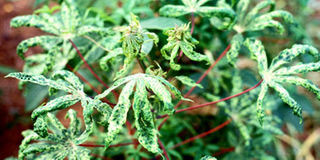Whiteflies wreak havoc on cassava

Farmers in Tanzania are losing up to four million metric tonnes of fresh cassava roots annually to tropical whitefly.
What you need to know:
The losses are in excess of $60 million annually between 1992 and 1997. Many farmers are reported to have abandoned the crop in large parts of the country.
Arusha. Farmers in Tanzania are losing up to four million metric tonnes of fresh cassava roots annually to tropical whitefly, an agricultural pest which has wreaked havoc on the crop.
The losses are in excess of $60 million annually between 1992 and 1997. Many farmers are reported to have abandoned the crop in large parts of the country.
In East Africa, which is one of the most affected areas in the world, farmers are reported to be losing over two thirds of their cassava crops to the pandemic of the whitefly-borne cassave mosaic disease.
“Damage through feeding by the pest causes severe economic losses in a wide range of food crops grown by millions of smallholder farmers,” said Dr January Mafuru, the Northern Zone director of research in the Ministry of Agriculture, Livestock and Fisheries Development.
Speaking at the start of the Second International Whitefly Symposium, the official said the high population of whiteflies is behind the two deadly viral cassava diseases spreading rapidly in eastern and southern Africa.
These are Cassava Brown Streak and Cassava Mosaic disease. “Whiteflies and whitefly-transmitted viruses (WTVs) are also one of the biggest constraints to vegetable production with farmers often resorting to heavy use of pesticides, putting their lives and that of their customers at risk,” he said.
Dr Mafuru, who also heads the Selian Agricultural Research Institute (Sari) based in Arusha, said the pest posed a threat to food security in Tanzania and many other countries in sub-Saharan Africa because they destroyed and spread diseases to important food crops such as vegetables, beans, cassava and sweet potatoes.
The director of Mikocheni Agricultural Research Institute (Mari), Dr Joseph Ndunguru, told reporters on the sidelines of the conference that the centre had started to breed and develop seeds which were resistant to a range of diseases caused by viruses spread by the whitefly pest.
“Many countries have suffered losses caused by whitefly and Tanzania is not an exception. Vegetables, cotton, sweetpotatoes, cassava and flowers have suffered huge losses owing to whitefly attack,” he said.
Dr James Legg from the International Institute of Tropical Agriculture (IITA) said some control strategies against whiteflies and whitefly-transmitted viruses had also worsened the problem.




